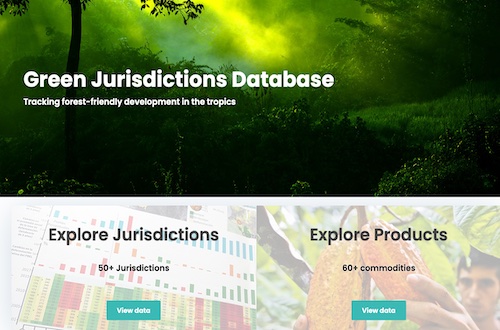Reliable, timely information is an essential pillar of sustainable development.
Aggregating the best data available on forests, carbon emissions, agricultural production, along with social indicators, policies and programs, the Green Jurisdictions Database (GJD) is designed to support states and provinces in tropical forest regions that are moving down this path.
 EII’s Green Jurisdictions Database is designed to support tropical forest states and provinces moving down the path of sustainable development
EII’s Green Jurisdictions Database is designed to support tropical forest states and provinces moving down the path of sustainable development
Providing a detailed look at deforestation and related emissions through a jurisdictional lens, the GJD allows visitors to analyze a range of indicators including agricultural production, livestock, social and economic development, and governance at the subnational level.
Visitors to the database will also find area, productivity and production data for more than 60 crops, covering not only commodities like soy or palm oil—often linked to increased forest loss—but also regional crops like coffee, cacao, avocados, and durian.
That level of granularity is critical to a better understanding of deforestation and related challenges within individual jurisdictions and can better help to inform decision makers working to devise solutions. At the same time, it increases transparency by providing a means of checking government claims on forest protection and sustainable development against all available data.
The increased attention to the role of tropical forests in slowing global warming and mitigating climate change—including the new LEAF (Lowering Emissions by Accelerating Forest finance) initiative, which aims to accelerate international finance for forest protection—has led to heightened recognition of the important role sub-national jurisdictions play in their protection. Supporting these jurisdictions in that effort requires an understanding of the dynamics behind regional forest loss, a key focus of the GJD that sets it apart from other existing platforms.
With the GJD EII has lowered the barrier to accessing critical data on forests and sustainable development across 55 tropical forest JDXs (including roughly 1500 second order jurisdictions), with plans to cover nearly one half of all tropical forest jurisdictions worldwide by 2022
EII’s Technical Services
EII’ supports a wide range of activities critical to conservation and sustainable development in tropical forest jurisdictions worldwide. Learn more about how we can support your sustainability goals below.
Customized web applications to track progress in jurisdictions:
Communicate your investment, impact and jurisdictional initiatives with dynamic web applications that leverage geospatial and statistical analysis to provide evidence based reporting on progress across a wide range of indicators.
See examples of our work in Colombia and Brazil:
Options assessments for monetizing forest carbon
Technical assistance to assess options for jurisdictions to monetize their emissions reductions through market, results-based payment, and carbon-neutral commodity approaches.
Forest-friendly development strategies
Receive evidence driven guidance on investment plans aligned with context relevant sustainability goals.
Jurisdictional sourcing of commodities
Identify potential risks and discover opportunities for investment in low-emission agricultural products in tropical forest regions.
Impact assessment of public policies and market-based strategies
Measure the impact and identify strategic actions that support adaptive management or timely adjustment of conservation initiatives.
See our case study analysis of Ecuador’s REDD Action Plan: ADAPTIVE MANAGEMENT OF JURISDICTIONAL REDD+ PROGRAMS: A METHODOLOGY ILLUSTRATED FOR ECUADOR
